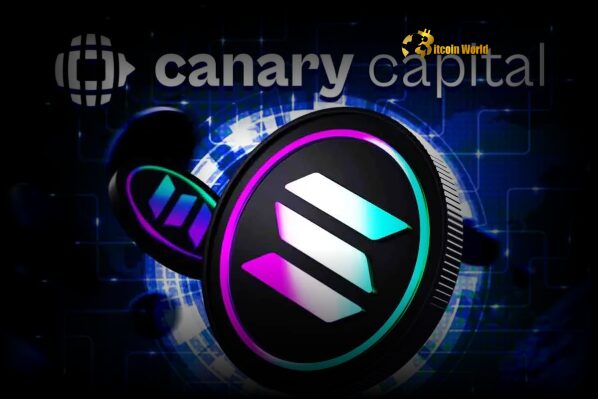BitcoinWorld

Solana ETF: Exciting Step as Canary Capital Registers Delaware Entity
The world of digital asset investment is buzzing with activity, and a recent development regarding a potential Solana ETF is capturing significant attention. Digital asset investment firm Canary Capital has reportedly taken a notable step forward, completing the registration of the corporate entity designed to underpin its proposed Solana (SOL) exchange-traded fund (ETF) in Delaware, United States.
What Does Registering a Delaware Entity for a Solana ETF Mean?
For those tracking the intersection of traditional finance and cryptocurrency, the registration of a Delaware Entity for a financial product like an ETF is a standard, yet crucial, procedural step. Delaware is a popular jurisdiction for incorporating businesses in the U.S. due to its well-established corporate law and court system. Registering an entity here is a foundational move for any firm planning to launch a regulated financial product like an ETF.
Think of it as laying the legal groundwork. Before you can file the necessary paperwork with regulatory bodies like the U.S. Securities and Exchange Commission (SEC) to actually launch an ETF, you need a legally recognized structure (the entity) to house the fund’s assets and operations. Canary Capital’s action signals their serious intent to bring a Solana-focused investment product to market.
Why is a SOL ETF a Big Deal?
Exchange-Traded Funds (ETFs) have become incredibly popular investment vehicles because they offer investors an accessible and often cost-effective way to gain exposure to an asset class, index, or sector without directly owning the underlying assets. For cryptocurrencies like Solana (SOL), an ETF wrapper could potentially unlock significant institutional and retail investment that might otherwise be hesitant to deal with the complexities of direct crypto ownership, such as setting up wallets, managing private keys, and navigating exchanges.
A SOL ETF would trade on traditional stock exchanges, making it easy to buy and sell through standard brokerage accounts. This familiarity and ease of access can dramatically lower the barrier to entry for a broad range of investors, potentially leading to increased capital flows into the Solana ecosystem. It represents a maturation of the asset class, moving from niche digital markets to mainstream financial platforms.
Canary Capital’s Move: Who Are They and Why Solana?
While the report via BWE News on X highlights Canary Capital’s registration, it’s important to understand the context. Digital asset investment firms are actively exploring ways to package cryptocurrencies into regulated products following the successful launch of spot Bitcoin ETFs in the U.S. earlier this year. This success demonstrated significant market demand and established a potential regulatory pathway for other digital assets.
Solana has emerged as a prominent blockchain platform known for its high transaction throughput and speed, attracting significant development activity and user adoption, particularly in decentralized finance (DeFi) and NFTs. Its growing prominence makes it a natural candidate for firms looking to offer diversified crypto exposure through ETFs. Canary Capital’s focus on a Solana ETF indicates their view on the asset’s potential and market demand.
The Staking Advantage: What Does Staking Support in a Crypto ETF Offer?
One particularly interesting detail from the report is that the proposed Crypto ETF supports staking. Staking is a process available on proof-of-stake blockchains like Solana, where token holders lock up their assets to support the network’s operations and security. In return, they earn rewards, similar to earning interest in a traditional savings account or dividends from a stock.
Including staking support in an ETF is a significant innovation for crypto ETFs. Traditional asset ETFs track the price performance of the underlying asset. However, holding assets like SOL directly allows for staking rewards, which can be a substantial part of the overall return, in addition to price appreciation. An ETF that incorporates staking could potentially pass these rewards onto the ETF holders, offering a more complete return profile that mirrors direct ownership.
Here’s a simple comparison:
| Feature | Traditional Price-Tracking SOL ETF (Hypothetical) | Canary Capital’s Proposed Staking SOL ETF (Hypothetical) |
|---|---|---|
| Exposure | Tracks SOL price performance | Tracks SOL price performance + Staking rewards |
| Income Generation | None | Potential yield from staking rewards |
| Complexity for Investor | Low (buy/sell on exchange) | Low (buy/sell on exchange) |
| Direct Asset Ownership | No | No (held by the fund) |
| Potential Total Return | Price change only | Price change + Staking yield |
This staking feature could make the proposed SOL ETF particularly attractive to income-focused investors or those seeking to maximize their total return from their Solana exposure without the operational burden of managing staking themselves.
Navigating the Regulatory Landscape: The Path Ahead for a Solana ETF
While registering a Delaware Entity is a necessary step, it is just one part of a long and challenging journey to launching an ETF in the United States. The primary hurdle remains regulatory approval from the SEC.
The SEC has historically been cautious regarding cryptocurrency products. While they approved Bitcoin spot ETFs after years of applications and legal challenges, and are currently considering spot Ethereum ETFs, the path for other cryptocurrencies like Solana is less clear. A key factor for the SEC is determining whether a cryptocurrency is considered a commodity (like Bitcoin and potentially Ethereum) or a security. The SEC has previously indicated that some cryptocurrencies, excluding Bitcoin, may be considered securities, which would fall under a different, potentially more complex, regulatory framework.
For a Solana ETF to gain approval, proponents will likely need to convince the SEC that SOL fits within a framework acceptable for an ETF structure, similar to how Bitcoin and Ethereum are being evaluated. This involves demonstrating market maturity, surveillance sharing agreements with regulated markets, and investor protection measures.
Benefits and Challenges of a SOL ETF
Bringing a SOL ETF to market comes with potential benefits and inherent challenges:
Potential Benefits:
- Increased Accessibility: Opens up Solana investment to traditional investors via brokerage accounts.
- Enhanced Liquidity: Trading on major exchanges can increase liquidity for SOL.
- Regulatory Clarity: Provides a regulated investment pathway, potentially attracting institutional capital.
- Staking Yield: The potential to earn staking rewards within the ETF structure is a significant draw.
- Convenience: Removes the technical complexities of direct SOL ownership and staking for investors.
Potential Challenges:
- Regulatory Approval: The SEC’s stance on Solana’s classification remains a major hurdle.
- Market Volatility: Solana’s price is highly volatile, and an ETF would be subject to this volatility.
- Staking Risks: While the ETF manages staking, underlying risks like slashing (loss of staked funds due to validator errors) still exist and would impact the fund’s performance.
- Fees: ETFs charge management fees, which would reduce the overall return compared to direct, self-managed staking.
- Tracking Error: An ETF’s performance may not perfectly track the underlying asset’s performance due to fees, operational costs, and potential complexities in managing staking within the fund.
What’s Next? Actionable Insights for Observers
Canary Capital’s Delaware Entity registration is an early step. The next critical phase will be the filing of formal applications with the SEC (likely S-1 and S-1/A filings). These filings will provide much more detail about the proposed ETF’s structure, custody arrangements, staking methodology, and risk disclosures.
Investors and market participants should watch for these filings. They will offer insights into how Canary Capital plans to address regulatory concerns and manage the technical aspects of a staking ETF. Monitoring SEC commentary and actions regarding other crypto ETFs (especially Ethereum) will also be crucial, as regulatory precedent plays a significant role.
Furthermore, observing the broader market sentiment towards Solana and institutional interest in the asset will provide context for the potential demand for such an ETF. While the timeline for potential approval is uncertain and could take many months or even years, this registration confirms that firms are actively working to bring Solana to the mainstream investment landscape.
Conclusion: A Promising Sign for the Solana ETF Future
The registration of a Delaware Entity by Canary Capital for a proposed staking Solana ETF is a concrete indicator of growing interest in bringing Solana into traditional finance. While significant regulatory hurdles remain, particularly regarding the SEC’s view on SOL’s classification, this move signals intent and progress.
A staking-enabled Crypto ETF for Solana could offer investors a compelling blend of price exposure and yield generation through a familiar, regulated investment vehicle. As firms like Canary Capital continue to push forward with these initiatives, the potential for broader institutional and retail adoption of Solana through accessible ETF products becomes increasingly real. The journey is far from over, but this is undoubtedly an exciting development for the Solana ecosystem and the wider digital asset market.
To learn more about the latest crypto market trends, explore our article on key developments shaping institutional adoption of digital assets and their potential impact on market developments.
This post Solana ETF: Exciting Step as Canary Capital Registers Delaware Entity first appeared on BitcoinWorld and is written by Editorial Team





